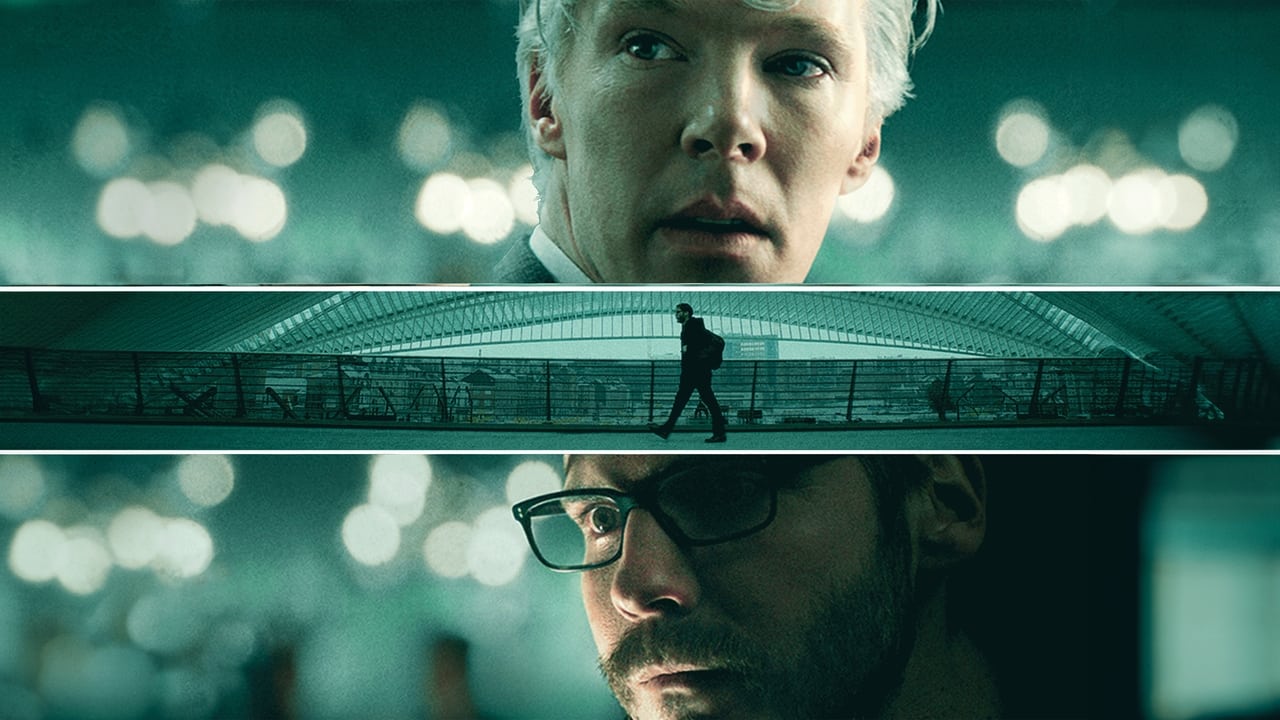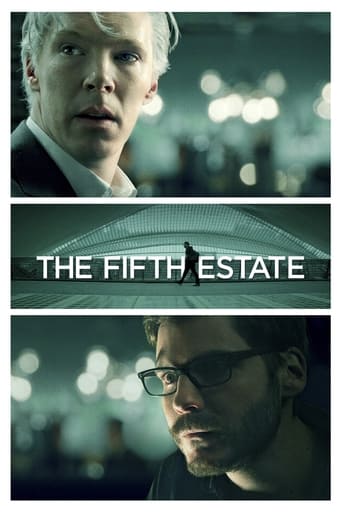Calum Hutton
It's a good bad... and worth a popcorn matinée. While it's easy to lament what could have been...
Lidia Draper
Great example of an old-fashioned, pure-at-heart escapist event movie that doesn't pretend to be anything that it's not and has boat loads of fun being its own ludicrous self.
Roxie
The thing I enjoyed most about the film is the fact that it doesn't shy away from being a super-sized-cliche;
Sabre Ryder
Its been a while since i found a thriller that i enjoyed. was made all the more interesting by the fact that this was around real events. the leaking of truth that so called western democracies would rather have buried, such as the US helicopter killings of 2 reuters journalists and dozens of civilians is just one of the groundbreaking stories that has been broken to the public by the whistleblowers.
its also an insight into the relationships and tension between the various founders behind this global organisation.
nzswanny
I began this movie, with high expectations, expecting a thought provoking drama with good acting and dialogue. I find the story for the WikiLeaks owners life to be quite interesting, and when I found out there was a movie about that, I grinned in excitement. The owner for WikiLeaks had an interesting life, and could actually be made into a masterpiece of a movie, if the director does not mess up. I was hoping the director for this movie would not mess up. I was telling myself, "Come on, it is a movie about WikiLeaks! It'll be great!"I was gravely wrong.One of the things I hate in some movies is the infamous shaky camera and quick cut clichè. It drives me nuts, because I am not able to focus on what is going on in the scene. But sometimes, the shaky camera and quick cuts, if not used excessively, can be used quite well.Almost every shot in the first half of this movie used quick cuts and shaky camera poorly.I told myself, "Come on, keep watching the movie. It will get better!"It did, sure. But that isn't saying much.Also, there was a try-hard "emotional" scene near the start of the movie, where we get a brief glimpse into the owner of WikiLeaks's childhood. The scene felt very forced, and soon enough I think the wall was bashing his head on mine because of how painfully awfully forced that scene was. That scene could of been sad, if there was a build up to it, instead of some shaky quick cut shots of technology.This also tried to act stylized. You know, like how Wes Anderson and Stanley Kubrick have their style. But, the thing with their styles, is that they are not forced. The style in this movie was forced. Forced with a capital F."Your cows seem a little depressed."Thats a line from this movie. There is more intelligent dialogue like that in the movie, don't worry.I don't know. Maybe if you are a huge fan of Benedict Cumberbatch speaking in a Australian accent, you'll enjoy this. If you are not, I suggest you don't watch it. If you have an IQ of nine, you may say "Shut up! I will decide if I like this movie myself!"Okay, decide if you want. But I am warning you.5.6/10.
Dave McClain
In Medieval Europe, the First Estate was the clergy, The Second Estate was the nobility and The Third Estate were the commoners – basically, what we would call today "the 99%". The term The Fourth Estate emerged later as a designation for a group of people who aren't large in numbers, but are great in influence – usually the news media. This leads us to the title of the 2013 film "The Fifth Estate" (R, 2:08). What if there were another group of people, further outside the older classes of society – a group that was an offshoot of The Fourth Estate, smaller in size, but greater in influence? In this, The Information Age, the internet has created such a group, a group that plays a role similar to The Fourth Estate, but does it completely independently and with no accountability. It's a group that is influential enough, and different enough from the established media, that a new name seems appropriate to describe this group. This is The Fifth Estate, and there is no better example of The Fifth Estate than the WikiLeaks website, publisher of documents leaked to the site by people within corporations, military and government organizations who feel that they have a responsibility to expose corruption, questionable practices, lies and policies and practices with which the leaker simply disagrees. Calling a movie about WikiLeaks "The Fifth Estate" begs the question: Can people who work with such an organization really be called journalists, are they lawbreakers, or are they something new and different, something that defies definition? It's an important question and it's what this film asks its audience.WikiLeaks went online in 2007 and was the creation of one man, Australian computer hacker – turned activist and publisher Julian Assange. Benedict Cumberbatch does a remarkable job portraying the enigma that is Assange. In Cumberbatch's hands, Assange is a brilliant visionary… as well as arrogant, rude, manipulative, paranoid, self-righteous and definitely lacking in the social skills. He makes Apple Computers co-founder Steve Jobs look like a puppy dog. Daniel Bruehl plays Daniel Berg, a computer genius who hitches his wagon to Assange's rising star. Berg believes in Assange's goal of revealing the truth about powerful organizations, especially those corrupt, scandalous, embarrassing, or just uncomfortable truths which Assange, Berg and a small group of friends believe can make a difference if exposed to the light of day. Over time, however, Berg comes to see Assange for the man he really is and grows increasingly upset over what he sees as Assange's recklessness in publishing hundreds of thousands of leaked U.S. military and State Department documents and communications without redacting names and other information that, if made public, could endanger the lives of all kinds of people all over the world. That's where Laura Linney, Stanley Tucci and Anthony Mackey come in, as government officials trying to limit the damage from WikiLeaks releasing the biggest treasure trove of documents the website (or any organization) has received from a single source. That source was former Army intelligence analyst Bradley Manning, eventually convicted of violating the Espionage Act and other crimes and sentenced to 35 years in prison (and has since assumed the identity Chelsea Manning).This should be seen as an important movie, regardless of one's opinion of the people and events portrayed. First off, WikiLeaks (along with the connections established among people around the world on social media websites) helped lead to the Arab Spring and other significant political changes in many different countries over the few years following Manning's actions. Secondly, whether you agree or disagree with Assange's approach to journalism (or whether you even consider him a journalist at all), this movie raises important questions that existed before the world even heard of Julian Assange, will exist into the foreseeable future, and may never go away. When does the freedom of the press enshrined in the U.S. Constitution conflict with the basic human rights to life, liberty and the pursuit of happiness promised in the Declaration of Independence? Is there any way to hold people who post news on the internet accountable without violating our most treasured freedoms? Where is the line between whistle-blower and traitor – and who decides where to draw that line? This film suggests the importance of asking all these questions and more without coming right out and asking them. This film also avoids suggesting that there are any easy answers. As entertainment, many will find "The Fifth Estate" a bit dry, a bit long or both. The director does his best to keep the film engaging by getting the best out of his talented cast, editing and scoring the film to create tension and using creative settings and camera work to represent certain concepts and events in the story. However, the real strength of this film is in its educational value and its ability to get the audience to think about some significant issues that face our country and our world - right now, today - and aren't going away any time soon. At the end of the day, isn't that one of the things that we want (and really need) movies to do – at least some of the time? That is a question that I think this film does answer and that answer is a resounding "yes"! For the significance of this film, its execution and its overall entertainment value, I give "The Fifth Estate" a "B".
thomas more
I'll just leave to Wikileaks's response the task of identifying all the gross factual mistakes done by the movie (just search for 'wikileaks internal memo fifth estate').This film is a joke, the objective of tarnishing Assange's image is obvious from beginning to end. It keeps portraying him as a paranoid, egoist, narcissist, sexual maniac, manipulative person, that has no principles whatsoever. Sometimes it even shows him as having some ideals, as a lapse, and then he comes back to his psychopath persona. Really, with so many factual blunders, there's nothing to comment except that it's a poorly written fairy tale.If you have any interest in this topic, I'd rather spend my time and money on the 'Mediastan' documentary.

